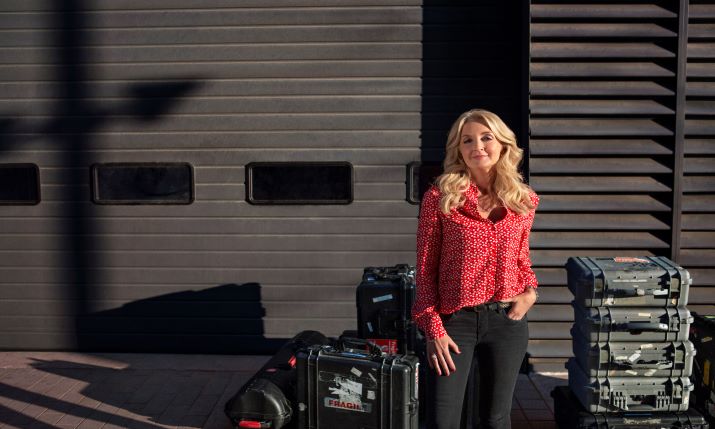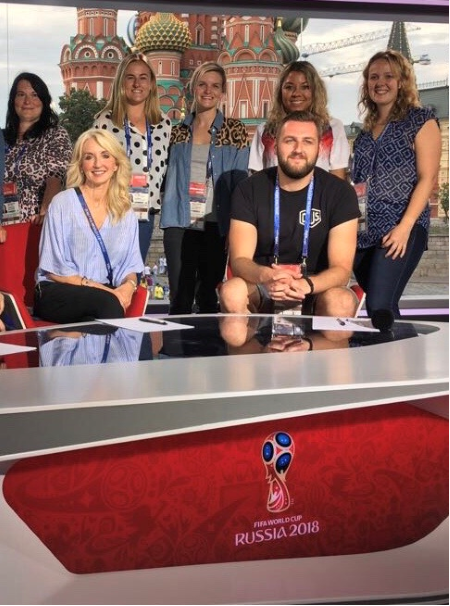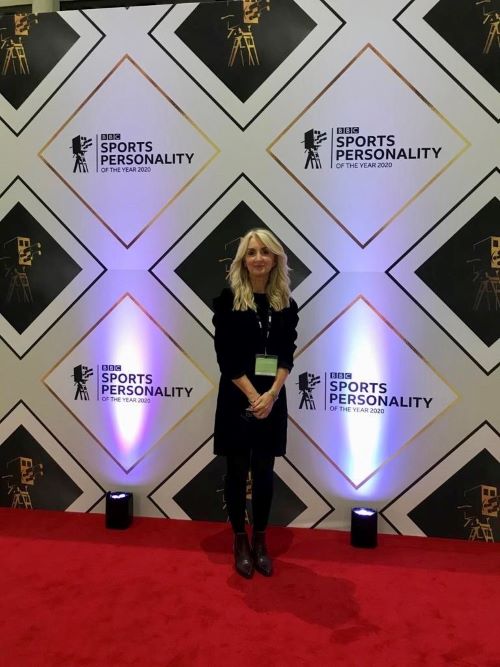Straight from school to head of production: The rise of BBC Sport’s Debbie Dubois
International Women's Day 2021 focus

BBC Sport’s head of production, Debbie Dubois
Today most people feel that a degree is an absolute necessity when seeking a job in sports broadcasting. It has not always been this way, however, and the rise of BBC Sport’s head of production, Debbie Dubois, is a perfect example of making your way to the top on talent and initiative, determination and resilience.
She says: “The industry felt quite different in the late eighties when I first started out, and so my route in and background didn’t necessarily mirror that of my colleagues. Having not come via the university degree route I struggled with that initially in terms of my career progression and the confidence to believe that I could make that next step.
“Think more broadly than sport to gain as wide an experience across a wealth of genres at the start of your career; that wider knowledge and experience will stand you in good stead and the skills you gain will be transferrable to sport but will give you a different perspective”
“Now it’s not even a consideration; I see it as a positive that I came in without a degree, from a northern working class background, and worked my way up,” Dubois claims. “You need determination and resilience to push through those challenges and know that you bring something different to each role in terms of your background and experiences. Finding a mentor who can give you that support, endorsement, and push is also crucial, and at various points along the way I had that guidance when I needed it.”
With diversity and inclusion at the forefront of most broadcasters’ agendas now, and with International Women’s Day 2021 on 8 March upon us, it is important to see how those in the industry can make positive steps towards wider diversity and inclusion.
“Seeing women in any role across the business can make a difference to that inclusion,” says Dubois. “Particularly if those women are in leadership roles. You need those role models for others to see that it is possible to make that progression. Finding a mentor who can support you and advise at various points, particularly when you feel you’ve hit a wall with regards to your career progression, can be invaluable. Likewise, make sure you acknowledge the importance of teamwork and recognising those around you who are often in the background but who play a vital role in their contribution.”
She comments on what she would advise other women looking to get into a role similar to her own: “Think more broadly than sport to gain as wide an experience across a wealth of genres at the start of your career; that wider knowledge and experience will stand you in good stead and the skills you gain will be transferrable to sport but will give you a different perspective,” she continues. “The same applies to roles and progression; I worked in radio for a period of time and working with smaller teams and tight budgets makes you creative in terms of your decision making and finding solutions.”

BBC Sport’s production management team in the World Cup 2019 studio in Russia, with head of production Debbie Dubois front left
Upwardly mobile
Dubois did not have TV broadcasting on her radar at first. “As a career path it wasn’t something I even had considered at school,” she says. “I did a business studies course with Spanish at college and then came into the BBC in a business support role.
“The BBC offered — and still does — so many ways to progress your career and the opportunities it presented to me really sparked my interest in production,” she continues. “Once in, I took every opportunity to gain production experience, from manning phones on a Saturday for a children’s show to sending out factsheets in the evenings after the day job finished, or working on appeal night for Children in Need. It all gave me valuable experience so that I could apply for production roles.
For over 20 years, Dubois worked in both TV and radio, moving around the BBC’s factual, daytime, lifestyle and events departments, covering everything from a Papal visit to a royal funeral. Working in factual offered exposure to a range of formats, from magazine style to live studios and OB programmes, which included an element of live events.
“I also worked across lifestyle titles such as Countryfile and cookery series, daytime consumer shows with high volume, low cost production models, which had a very different set of issues from delivering a major event in an overseas location,” she says. “All of those varied experiences shape your thinking and give you that breadth of knowledge to deal with whatever production challenges might come your way.”
When the role in BBC Sport came up in 2011, she was a highly experienced production executive who had been working in factual for over a decade. “I felt the time was right for me to try a new genre, so I applied for it and was appointed.”
It was a, “tricky time to join” BBC Sport, as the department was still in the early stages of its move to Media City, and so operations, teams and Dubois’ time was split between London and Salford for at least 18 months. “There were new studios, technical facilities, and buildings to get across, but once we got through that initial period and the teams were all relocated it got easier to manage,” she says. “By then I had familiarised myself with a new department. In some ways moving across into sports output and the skills transfer across in terms of production was the easier bit, it was more of the culture change and joining at a time when for many the move and relocating was a huge life change for them.”
Now, Dubois says it feels a very different place to work. “The site has continued to grow and the teams are a blend of those who have made the move and new recruits who have joined from across the site or from other broadcasters and Indies – many who like me didn’t start in sport. It’s great to have so much breadth of experience and knowledge in our teams and without the move many wouldn’t have been part of that story.”
Team player
Dubois says her wide experience has given her, “an understanding of different production requirements and the hands on experience of budgeting, staffing and resourcing,” them.
That is particularly true when working on major events, and one of her personal highlights was being part of the coverage of the World Cup in Russia in 2018.
“The fantastic teamwork on all platforms working across editorial, technical and production management really delivered for the audience onscreen,” says Dubois. “Russia offered a stunning backdrop and crucially England had a fantastic tournament, which was reflected in those tuning in to watch; the nation really started to believe we could make it all the way to the final and bring the trophy home. Sadly it wasn’t to be.”
The World Cup Final, even without England, reached 14.3 million people on TV, 80% exclusively on the BBC, while the World Cup Daily Podcast had around four million downloads for the throughout the whole tournament.
“In terms of the production, we really moved forward on a number of fronts in Russia including increased collaboration with ITV, the 360° Red Square presentation studio and delivery of all BBC live matches in a parallel UHD HDR stream to iPlayer; the first time for live iPlayer content,” says Dubois. “It really was one of those events where everything came together across all platforms and delivered across a range of measures: audiences, internal and external collaboration, innovation and the overall quality of the coverage. That innovation was recognised with a BAFTA for Best Sport Programme. It was definitely a career highlight for so many of us who were part of it.”
Dubois feels sport has a fantastic ability to bring people together. “We see that when people really unite behind those big sporting moments,” she says. “The amazing range that we have in BBC Sport from the weekly football shows such as Match of The Day (MOTD), athletics, rugby, cricket, tennis across the summer, with Wimbledon being a personal highlight, through to our major events with Euros and The Olympics, culminating in December with Sports Personality of the Year; it’s just fantastic to be part of. It’s fast-moving, varied, challenging and there’s a great sense of team and a real passion for the output. I love the variety and the commitment to what we deliver.”

BBC Sport’s Debbie Dubois on the red carpet for the BBC’s Sports Personality of the Year 2020
Remote control
That team spirit must have been tested under the impact of COVID-19. “We’ve had to adapt quickly to the challenges that the pandemic has presented in terms of how we work safely and remotely to deliver content and that has affected and influenced how we will move forward into the rest of this year and possibly beyond,” says Dubois. “The pressure on the teams across technological transition and working remotely has had its challenges. Our remote production plans were already in motion at the start of 2020, but the speed at which we expedited those plans and finding ways as we did during the first lockdown to deliver content with our talent away from the usual studio setting was impressive.
“The hours of planning for how to work effectively and safely in a COVID-affected world for those that have to work in the office delivering live output was vital,” she continues. “The remodelling across our buildings and in the studio to allow that work to happen safely has been extensive.”
Dubois is starting to look at what the new ways of working might look like. “Taking the best of the learnings from the last year, we know that teams have liked the flexibility this time has given them and would like to work differently in the future. Equally we’re also mindful that teams want to be able to meet up in a safe environment, so it’s about finding the right balance and looking for the opportunities that will shape the way we work after the virus.”
The pandemic did see one positive change when, for the first time since the Premier League’s inception in 1992, the top flight football tournament was shown live on the BBC after it restarted in June 2020.
“We were mindful of the circumstances in how this has come about, but the audience appetite during this period for live sport content has been huge and the return of MOTD brought football back to as many people as possible, especially as fans have been absent from stadiums now for the best part of a year,” says Dubois. “Those Premier League games sit alongside the BBC’s existing live FA Cup offering and we’ve seen extraordinary figures for this too; the FA Cup fourth round clash between Manchester United and Liverpool pulled in a peak audience of over nine million across TV and Red Button. We know that around 60% of those who follow the Premier League can only access it through the BBC, so the return of our regular programming helped to bring back that element to their screens that viewers had missed.”
Thinking green
Another challenge for now and the future, is Dubois notes, that of making sure that BBC Sport adheres to crucial sustainability goals. “As we begin to hopefully rebuild from the pandemic in 2021, there is discussion about the opportunity to build back better and for a green recovery – that also applies to sport,” she says. “The shift to remote working, and the ways that the industry has responded to the sporting and operational challenges of the pandemic, have sharply focused the environmental agenda.
“It’s said that the challenges faced by the television sports community are quite unique because of the nature of the sporting calendar and the events we cover,” she continues. “With that in mind, the BAFTA Sports Consortium has been set up to reduce the impact that sports broadcasting has on the environment. By sharing best practice, there is an opportunity to collaborate to find solutions that can help us work towards achieving net-zero carbon emissions.
“The BBC has pledged to be carbon neutral by 2030 and we are working hard to play our part to deliver that by looking at our production models,” she adds. “That doesn’t mean you can’t still have an on-site presence, but we’re looking at ways of reducing some of the infrastructure. We know that audiences love to get a feel of the atmosphere and a sense of the event and we still need to deliver that, so [much like her approach to teams working post-COVID] it’s about getting the balance right.”

